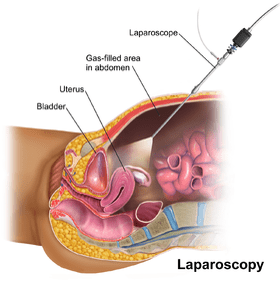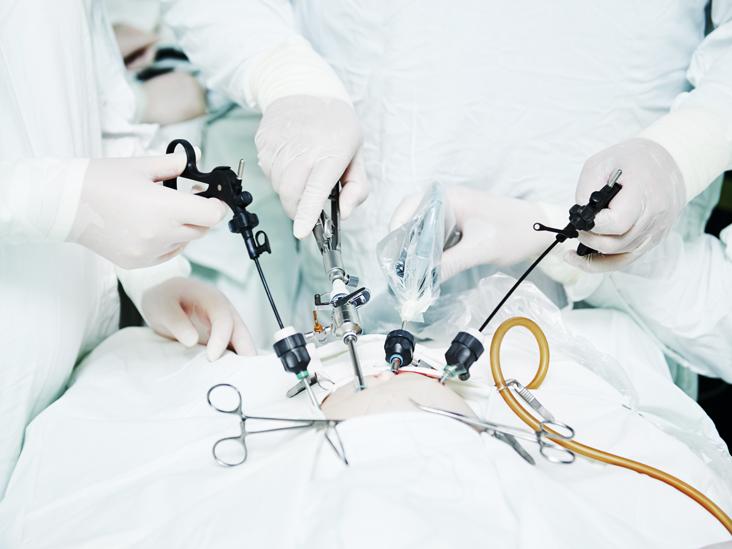At Kanaa Fertility Centre, laparoscopy in Chennai is done by the highly experienced specialists with the latest equipment to treat and diagnose fertility issues. The minimally invasive method has been a success story in contemporary reproductive treatments, providing patients with high precision and less discomfort.
Laparoscopy is also known as keyhole surgery, a type of surgical procedure that allows the surgeon to access the inside of the abdomen and pelvis without having to make large incisions in the skin. The advancement in medical technology has transformed this procedure hat is highly accurate and efficient, lowering the risks linked to open surgeries.
Laparoscopic surgery in Chennai has become a popular medical option thanks to its minimally invasive approach and successful outcomes. This surgical method has transformed the way procedures are conducted, providing patients with quicker recovery periods, less pain, and minimal scarring.

A laparoscopy is usually performed as an outpatient procedure, meaning many patients can return home on the same day of surgery. It can be conducted in a hospital or an outpatient surgical center.
Diagnostic laparoscopy infertility is utilized to check the uterus, fallopian tubes, and ovaries in order to diagnose reasons for infertility. It assists in confirming conditions such as endometriosis, fibroids, adhesions, or blocked fallopian tubes laparoscopy.
Operative laparoscopy enables surgeons to treat abnormalities on the same day if they are found. Examples include scar tissue removal, endometriosis treatment, or laparoscopy fibroids treatment to enhance fertility results.
Laparoscopy for infertility is usually advised in case of patients with unexplained fertility or suspected pelvic pathology. It offers direct viewing and treatment during a single visit, improving the chances of achieving conception spontaneously or by assisted reproductive methods.
Laparoscopy to diagnose and remove endometrial growths outside the uterus is done at Kanaa. It cures pain, decreases inflammation, and greatly improves fertility results.
Fibroids may interfere with implantation and pregnancy. With our laparoscopy fibroids treatment, removal of fibroids is safe with less scarring and quicker recovery than with open surgeries.
The laparoscopy procedure is performed under general anesthesia.
The primary purpose of laparoscopy is to diagnose or treat conditions related to the reproductive organs. During the procedure, the surgeon will look for possible causes of infertility. These could include:
By identifying these underlying causes, the surgeon can plan the most appropriate course of treatment, enhancing the chances of a successful pregnancy.
Preparation for Laparoscopy Procedure has a couple of important steps to guarantee safety and efficiency:

Laparoscopy Surgery Safety is given the highest priority at Kanaa Fertility Centre. Laparoscopy is minimally invasive and usually safe, but the following risks must be kept in mind:
With highly skilled surgeons, sophisticated equipment, and careful safety measures, safety in laparoscopy surgery is ensured at the highest levels.
Laparoscopy and hysteroscopy are two minimally invasive procedures but differ in purpose and approach. Laparoscopy is performed through small cuts on the abdomen to inspect organs within the pelvic or abdominal cavity, making it useful for evaluating infertility, endometriosis, or ovarian cysts. In contrast, hysteroscopy involves no external incision and is carried out by passing a thin scope through the vagina into the uterus, mainly for detecting and treating fibroids, polyps, or other uterine abnormalities. Recovery from laparoscopy usually takes a few days with mild to moderate discomfort, whereas hysteroscopy typically has a much shorter recovery time—often just a day—with minimal pain.
Laparoscopic surgery has transformed the medical field due to its many benefits:

Laparoscopy is very successful in diagnosing and curing infertility-related complications.
Scores of patients undergoing laparoscopy at Kanaa Fertility Centre have undergone successful pregnancies, which is an indication of the procedure’s efficacy as a minimally invasive treatment for infertility.
Laparoscopy Recovery Time depends on the procedure, but some general tips are:
Adherence to these advice guarantees unimpeded healing and minimizes the risk of complications.
Kanaa Fertility Centre is a best choice for laparoscopic treatment in Chennai, offering skilled surgeons, advanced technology, and comprehensive care. Known for its high success rates and affordable costs, Kanaa provides personalized pre- and post-surgical support, ensuring a smooth recovery.
Laparoscopy is recommended for the following conditions in infertility.
The procedure is performed with general anesthesia, so you are unlikely to feel pain.
Laparoscopy for infertility has the following advantages
The recovery time for laparoscopy for infertility depends on whether it is a diagnostic procedure or operative procedure. A diagnostic laparoscopy for infertility can take about 30 minutes and you can be discharged in a few hours. In case of operative procedure, you may be advised to rest for a few days. This is best discussed with your doctor.
The laparoscopy procedure typically lasts between 30 minutes and 2 hours, depending on whether it is diagnostic or operative.
Yes, laparoscopy for infertility can improve fertility by treating conditions like endometriosis, fibroids, or adhesions. Your doctor will advise when it’s safe to try conceiving post-procedure.
Since laparoscopy in Chennai uses small incisions, scars are minimal and fade over time.
Yes. Patients are advised not to eat or drink for 6–8 hours before the laparoscopy procedure to reduce anesthesia risks.
Light travel is usually safe after a few days, but avoid long trips or heavy physical activity until your doctor confirms full recovery.
Laparoscopy examines organs inside the abdomen and pelvis.
Hysteroscopy examines the inside of the uterus.
Recovery time and invasiveness differ, making each procedure suitable for specific conditions.